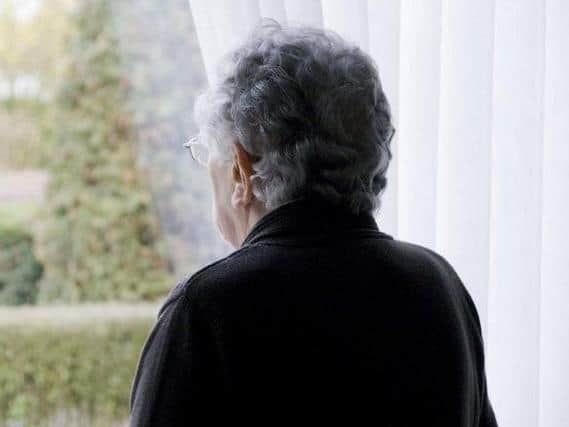New guidance published for the clinically extremely vulnerable ahead of lockdown
People in this group are strongly advised to stay at home at all times, unless they are going out for exercise or a doctor's appointment.
The clinically extremely vulnerable group includes those with reduced immune systems, specific cancers or severe respiratory conditions such as cystic fibrosis.
Advertisement
Hide AdAdvertisement
Hide AdPeople with chronic kidney disease (stage 5) and those undergoing dialysis, as well as adults with Down's syndrome, are being added to the shielding patient list by the NHS due to new evidence about groups more likely to be at risk of serious illness from Covid-19.


Those in the clinically extremely vulnerable group are strongly advised not to go to any shops or to pharmacies.
They are also advised to try to stay two metres away from other people within their household.
Full new guidance was due to be published by the Government on Monday, but did not appear until Wednesday.
Advertisement
Hide AdAdvertisement
Hide AdAt a session of the All-Party Parliamentary Group (APPG) on Coronavirus on Tuesday, charities highlighted the importance of receiving information in a "timely" way so they can communicate it to those who need it.
Following the publication of the advice on Wednesday, Tracey Loftis, head of policy and public affairs at Versus Arthritis, said: "Following the end of shielding in July, Versus Arthritis called on the Government for clear communication around shielding going forward.
"We are concerned that guidance to people who are clinically extremely vulnerable from Covid-19 has been published mere hours before England enters into a second lockdown. This will cause confusion and worry amongst many communities.
"Receiving information in advance is vital to helping charities to translate the guidance into language that can help and empower vulnerable people.
Advertisement
Hide AdAdvertisement
Hide Ad"Without advance notice, people do not have time to plan and adapt their lives for the new rules. This can affect jobs and caring responsibilities, leaving people feeling isolated and confused."
Paul Edwards, director of clinical services at Dementia UK, said releasing guidance for the clinically extremely vulnerable on the eve of the second lockdown "means the Government has once again done too little, too late for people to prepare".
He added: "By not including people with dementia in the classification, they have again left families affected by dementia in the dark, with no clear guidance and no access to support services trying to reach the clinically extremely vulnerable."
The Department of Health and Social Care (DHSC) said the Government will provide more than £32 million to upper-tier councils in England to support the clinically extremely vulnerable over the next month.
Advertisement
Hide AdAdvertisement
Hide AdDeputy chief medical officer for England, Dr Jenny Harries, said: "With the prevalence of the virus continuing to increase across England and in places across the world, it's right that we adjust our advice for the clinically extremely vulnerable accordingly so they can feel as safe as possible over the coming few weeks.
"Our guidance for this group of individuals has always been advisory, but I would strongly urge all those who are clinically extremely vulnerable to take these extra precautions to keep themselves as safe as possible."
Phillip Anderson, head of policy at the MS Society, said the second lockdown has left thousands of vulnerable people, including those with MS, feeling "extremely anxious and fearful once again".
He said: "Despite waiting days for new guidance, they have only been told to expect support locally for the next four weeks - leaving them in the dark on how they will be protected once the England lockdown ends.
Advertisement
Hide AdAdvertisement
Hide Ad"The Government must give clinically extremely vulnerable people urgent reassurance that, come December, if they are working in high-risk areas and can't work from home, they will be given financial support."
Edel Harris, chief executive of the learning disability charity Mencap, said adding adults who have Down's syndrome to the shielding list could lead to "even higher levels of loneliness for people in this group".
Gemma Peters, chief executive of Blood Cancer UK, said the charity is concerned that the guidance for people who are vulnerable to keep two metres away from others in their household may be impractical for many people.
"While this may be achievable if you have a large home, it is unrealistic if you share a small flat.
Advertisement
Hide AdAdvertisement
Hide Ad"This is another example of government guidance being much more difficult to follow if you are less well-off, and the Government should give specific advice and, if necessary, support, to people who can't socially distance from the people they live with," she said.
Louise Soanes, director of services at Teenage Cancer Trust, said this new guidance may cause the feelings of loneliness and distress that many felt earlier in the year to happen again.
She added: "With this guidance, the Government aims to protect the clinically extremely vulnerable, but by doing so, they must ensure access to services to support their emotional needs are available too."
Sarah MacFadyen, head of policy at Asthma UK and the British Lung Foundation, said: "Any clear guidance and clarification is a step forward.
Advertisement
Hide AdAdvertisement
Hide Ad"However only announcing this less than 24 hours before lockdown begins leaves people with serious lung conditions almost no time to prepare for the changes that will severely impact their lives over the next month.
"With people advised not to go to shops, including the pharmacy, it's vital that delivery systems are easy to access and properly funded so no one is left without essentials.
"The Government must ensure local authorities are given as much help as possible to support people and that the money promised gets to where it is most needed."